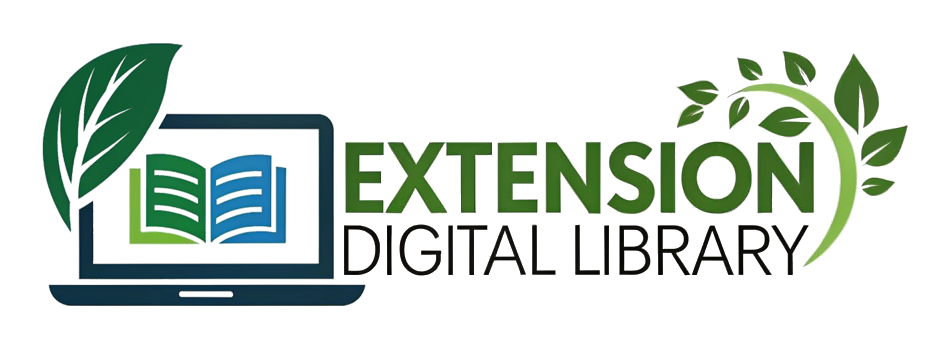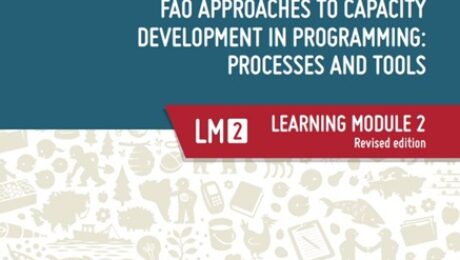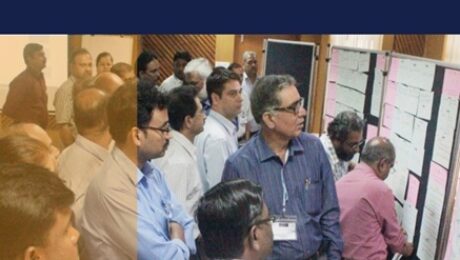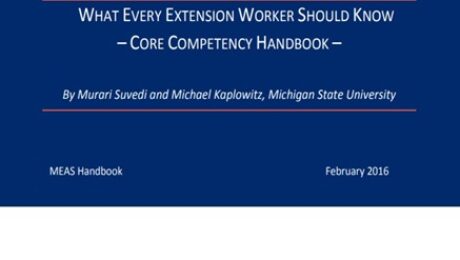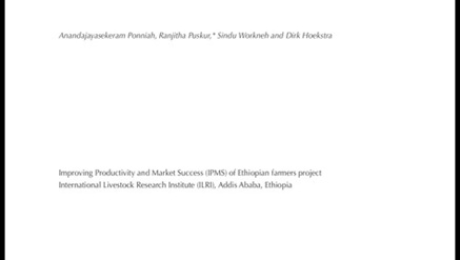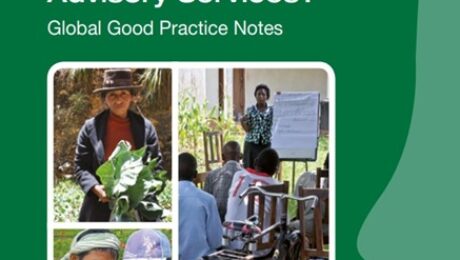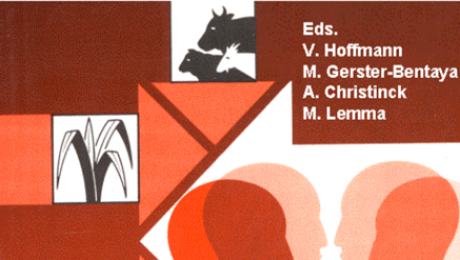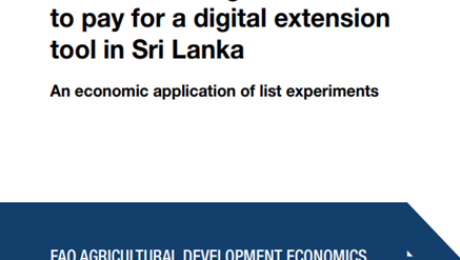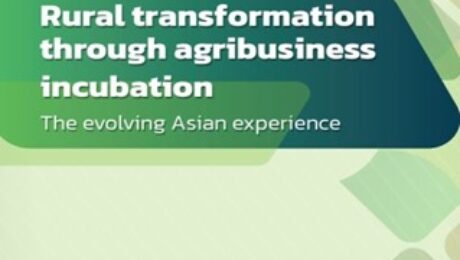FAO Approaches to Capacity Development in Programming: Processes and Tools
This FAO learning module is part of a series designed to strengthen Capacity Development (CD) in agricultural and development programming. It provides practical guidance, processes, and tools to help practitioners incorporate effective capacity-focused strategies into projects and programmes. The content supports FAO staff, partners, and stakeholders in assessing existing capacities, identifying gaps, setting clear objectives, and designing interventions that enhance sustainable capacities at the individual, organizational, and systemic levels. The module emphasizes engagement with national and local actors, context analysis, participatory design, and monitoring of capacity outcomes — all aimed at improving long-term development results.
- Published in CAPACITY DEVELOPMENT
Assessing Capacity Needs Of Extension and Advisory Services a Guide for Facilitators
The Global Forum for Rural Advisory Services (GFRAS) has articulated a new vision for Extension and Advisory Services (EAS) within the Agricultural Innovation Systems (AIS). This vision, articulated in its position paper, called The “New Extensionist”, argues for an expanded role for EAS (Box 1) within AIS and development of new capacities at different levels. The motive behind the development of The “New Extensionist” comes from the realisation that the existing EAS needs new capacities to respond effectively to the emerging challenges in agricultural development (declining water availability, increasing soil degradation, and changing and uncertain climate and markets). In the past few years, EAS’ capacities to perform their traditional roles, such as training and communication of technical information, have eroded. Meanwhile, the extension landscape has become increasingly pluralistic with greater participation of the private sector.
- Published in CAPACITY DEVELOPMENT
What Every Extension Worker Should Know – Core Competency Handbook
This core competency handbook is timely in the current context as it could elucidate multiple roles of extension in agriculture and rural development. Demands of several stakeholders on extension are increasing and so is the demand for enhanced capacities of extension professionals. Suvedi and Kaplowitz, the authors of this handbook, have identified core skills necessary for agriculture extension field level professionals to improve their capacity to address the emerging problems of the farming communities.
The book has nine chapters. The first chapter contains a brief history of extension services. The narration includes the evolution in extension approaches from the TOT of yesteryears to the present day demand-driven participatory and pluralistic extension. There must be a change in the mindset of the extension professionals to focus not only on technology transfer but also to deal with several challenges the farmers are encountering in their endeavour to increase the agricultural production and income from farming.
- Published in CONCEPTS AND PRACTICES
Concepts and practices in agricultural extension in developing countries: A source book
The first chapter outlines the emerging challenges faced by agricultural R&D sectors and how paradigms are evolving in response to these changes and challenges. The second chapter traces the evolution of agricultural extension thinking and practice. It highlights some generic problems faced at various stages of evolution and approaches to address them. It highlights the factors identified in literature as contributing to successful knowledge dissemination processes and creating higher access to clients to the services. While reflecting on the challenges and opportunities, the chapter also explores the possible future of extension services in developing countries. The third chapter gives an account of the various extension models, approaches and methods that have been tried out in developing countries and the experiences. The chapter concludes with the transition being made to agricultural innovation systems from Research & Extension systems and highlights the role of extension services in this context. Chapter four highlights the importance of farmer groups in providing effective extension services and promoting innovation. It explains in detail the processes, approaches and methods involved in group formation and development, management, performance assessment and, monitoring and evaluation. Chapter five lists and describes in detail the various tools and methods used in participatory research and development processes. Chapter six focuses on the very important issues of Monitoring and Evaluation as systems for learning and for facilitating reflective action cycles. The importance of participatory approaches in M&E, process monitoring and outcome mapping are highlighted. This book can be used by students and practitioners of extension, researchers and decision-makers. This is a collation of knowledge regarding the practice of extension and is not intended to be used as a recipe or blue print. Based on the context and the requirement, the approaches and tools should be selected, adapted and used. There is a built-in flexibility that would allow the user to employ his/her experience, creativity and imagination in adapting and using the approaches and tools described in this source book.
- Published in CONCEPTS AND PRACTICES
What Works in Rural Advisory Services ? Global Good Practice Notes
GFRAS used these definitions and combined them with the concept of ‘best fit’ to define good practices used in RAS as techniques or approaches that fit local sociocultural, ecological, economic, and political conditions and that embrace pluralism (that is, the provision of advisory services by different types of organisations); increase accountability to rural clients; are inclusive (engage marginalised groups such as women, youth, and the poor); develop human resource capacity; and are sustainable. Good practices allow RAS programmes to be more effective and efficient, and to meet programme goals. The techniques or approaches may concern advisory methods, structures, or governance.
- Published in CONCEPTS AND PRACTICES
Handbook: Rural extension, Volume 1: Basic issues and concepts
This is the first book in a three-volume series on rural extension (see 1553) aimed at promoting greater transparency in extension planning, implementation and evaluation. It discusses the role of extension in rural development, extension approaches, concepts and methods, and the use of extension aids and media. The book includes case-studies illustrating approaches and methods, and concludes with practical guidelines and checklists.
- Published in CONCEPTS AND PRACTICES
Farmers’ willingness to pay for a digital extension tool in Sri Lanka
List experiments utilize indirect survey questions to reduce social desirability bias in measures of sensitive behaviours and sentiments. While often used to assess retrospective behaviour or opinions of respondents, list experiments have not been widely applied to assessing “deep” parameters of economic models, such as willingness to pay. Common stated preference methods of estimating willingness to pay may be impacted by social desirability bias, particularly when a product has been provided to survey recipients for free. List experiments can uncover the share of respondents willing to pay a given price while reducing social desirability bias. Repeating the method at a variety of prices recovers a partial demand curve. This study discusses the conditions required to satisfy the list experiment validity assumptions and demonstrates the method in an e-extension platform randomized control trial in Sri Lanka. We show that the “no design effect” assumption for list experiments requires that the budget constraint for a household be non-binding. Under conditions where that assumption is likely to hold, we find direct estimates overstate willingness to pay at low prices. Our findings suggest list experiments may provide a cheap method of more accurately assessing the typically large share of respondents unwilling to pay any non-zero-sum (extensive margin) but are less effective at reducing bias from exaggerated demand (intensive margin).
- Published in NEW PUBLICATIONS, SRI LANKA
Rural transformation through agribusiness incubation-The evolving Asian experience
Agribusiness incubation (ABI) has emerged as a transformative strategy for revitalizing rural livelihoods, engaging youth in agriculture, and promoting sustainable technologies. This publication examines the pivotal role of ABIs in reshaping the agrifood system by providing essential support services and fostering collaboration among smallholder farmers and emerging entrepreneurs. As countries in the Asia Pacific implement diverse ABI models, the successful experiences from the Republic of Korea, India, the Philippines, and Viet Nam offer valuable lessons for addressing rural poverty, attracting youth, and mitigating climate change challenges.
- Published in NEW PUBLICATIONS
Future of Pulses and Legumes Seed Systems in India
This policy brief is a collaborative outcome of the Policy Dialogue jointly hosted by the International Crops Research Institute for the Semi-Arid Tropics (ICRISAT) and the Centre for Research on Innovation and Science Policy (CRISP) in November 2024. The dialogue brought together key stakeholders to deliberate on enhancing seed systems for dryland crops in India. The brief presents actionable recommendations to align seed policy with the evolving needs of farmers, researchers, and the private sector. It underscores the importance of supportive regulatory frameworks, increased public-private collaboration, and the role of innovation in improving access to quality seeds for climate-resilient agriculture.
- Published in NEW PUBLICATIONS
Gender Responsive Digital Extension and Advisory Services in Bangladesh and India
This paper jointly written by the Centre for Research on Innovation and Science Policy (CRISP), Hyderabad, India, and the Food and Agriculture Organization of the United Nations (FAO) explores the gender responsiveness of digital EAS in two Southern Asian countries – Bangladesh and India – where women play a critical role in agrifood systems.
Both countries have piloted and scaled various digital EAS models over the past decade. The study investigated the barriers that limit women’s uptake and effective use of these services.
- Published in NEW PUBLICATIONS
